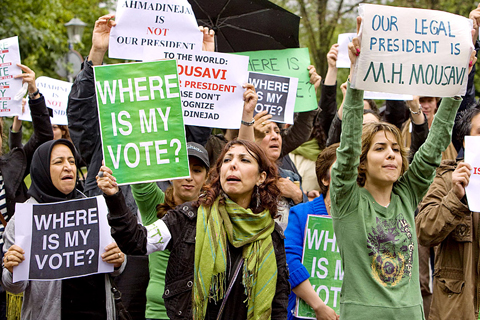How do you count almost 40 million handwritten paper ballots in a matter of hours and declare a winner? That’s a key question in Iran’s disputed presidential election.
International polling experts and Iran analysts said the speed of the vote count, coupled with a lack of detailed election data normally released by officials, was fueling suspicion around President Mahmoud Ahmadinejad’s landslide victory.
Iran’s supreme leader endorsed the hard-line president’s re-election the morning after Friday’s vote, calling it a “divine assessment” and appearing to close the door on challenges from Iran’s reformist camp. But on Monday, after two days of rioting in the streets, he ordered a probe into the allegations of fraud.

PHOTO: AFP
Mir Hossein Mousavi, Ahmadinejad’s reformist challenger, claims he was robbed of the presidency and has called for the results to be canceled.
Mousavi’s newspaper, Kalemeh Sabz, or the Green Word, reported on its Web site that more than 10 million votes were missing national identification numbers similar to US Social Security numbers, which make the votes “untraceable.” It did not say how it knew that information.
Observers who questioned the vote said that at each stage of the counting, results released by the Interior Ministry showed Ahmadinejad ahead of Mousavi by about a 2-1 margin.
That could be unusual, polling experts noted, because results reported first from Iran’s cities would likely reflect a different ratio from those reported later from the countryside, where Ahmadinejad has more support among the poor.
The final tally was 62.6 percent of the vote for Ahmadinejad and 33.75 for Mousavi — a landslide victory in a race that was perceived to be much closer. Such a huge margin also went against the expectation that a high turnout — a record 85 percent of Iran’s 46.2 million eligible voters — would boost Mousavi, whose campaign focused on young people. About a third of eligible voters were under 30.
Ahmadinejad said Sunday that the vote was “real and free” and insisted the results were fair and legitimate.
One of the central questions was how 39.2 million paper ballots could be counted by hand and final results announced by authorities in Tehran in just over 12 hours. Past elections took at least twice as long.
A new computerized system might have helped speed the process in urban centers, where most Iranians live, though it is unclear if that system was extended to every small town and village. And each ballot — on which a candidate’s name was written in — would still have to be counted by hand before any data could be entered into a computer, aggregated and transmitted to the Interior Ministry in Tehran.
Susan Hyde, an assistant political science professor at Yale University who has taken part in election monitoring missions in developing countries for the Carter Center, said that would be uncharacteristically fast.
“If they’re still using hand counting, that would be very speedy, unusually speedy,” she said.
The Interior Ministry released results from a first batch of 5 million votes just an hour and a half after polling stations closed.

IDENTITY: A sex extortion scandal involving Thai monks has deeply shaken public trust in the clergy, with 11 monks implicated in financial misconduct Reverence for the saffron-robed Buddhist monkhood is deeply woven into Thai society, but a sex extortion scandal has besmirched the clergy and left the devout questioning their faith. Thai police this week arrested a woman accused of bedding at least 11 monks in breach of their vows of celibacy, before blackmailing them with thousands of secretly taken photos of their trysts. The monks are said to have paid nearly US$12 million, funneled out of their monasteries, funded by donations from laypeople hoping to increase their merit and prospects for reincarnation. The scandal provoked outrage over hypocrisy in the monkhood, concern that their status

The United States Federal Communications Commission said on Wednesday it plans to adopt rules to bar companies from connecting undersea submarine communication cables to the US that include Chinese technology or equipment. “We have seen submarine cable infrastructure threatened in recent years by foreign adversaries, like China,” FCC Chair Brendan Carr said in a statement. “We are therefore taking action here to guard our submarine cables against foreign adversary ownership, and access as well as cyber and physical threats.” The United States has for years expressed concerns about China’s role in handling network traffic and the potential for espionage. The U.S. has

Trinidad and Tobago declared a new state of emergency on Friday after authorities accused a criminal network operating in prisons across the country of plotting to kill key government officials and attack public institutions. It is the second state of emergency to be declared in the twin-island republic in a matter of months. In December last year, authorities took similar action, citing concerns about gang violence. That state of emergency lasted until mid-April. Police said that smuggled cellphones enabled those involved in the plot to exchange encrypted messages. Months of intelligence gathering led investigators to believe the targets included senior police officers,

A disillusioned Japanese electorate feeling the economic pinch goes to the polls today, as a right-wing party promoting a “Japanese first” agenda gains popularity, with fears over foreigners becoming a major election issue. Birthed on YouTube during the COVID-19 pandemic, spreading conspiracy theories about vaccinations and a cabal of global elites, the Sanseito Party has widened its appeal ahead of today’s upper house vote — railing against immigration and dragging rhetoric that was once confined to Japan’s political fringes into the mainstream. Polls show the party might only secure 10 to 15 of the 125 seats up for grabs, but it is